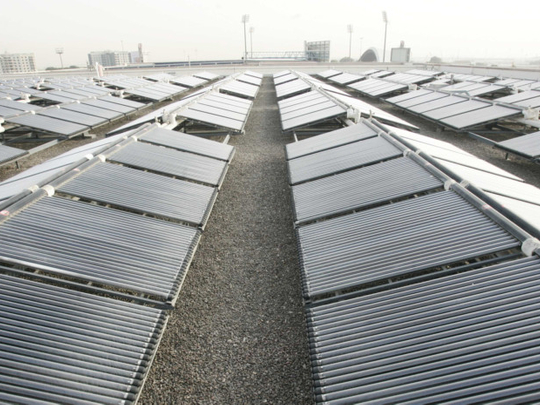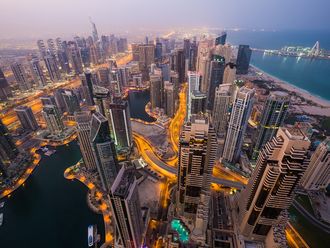
Spiraling energy bills in the summer always revive the debate surrounding energy conservation. We spoke to some experts to bring simple tips that can help save energy and reduce bills, not only in the summer months but throughout the year.
Experts, however, caution that sustainability needs to become a part of lifestyle changes and a habit to achieve maximum benefits.
Insulation
It’s the small things that can have the biggest impact, both on your pocket and the environment, says Vijay Kavasseri, general manager of MPLUS. A simple trick he suggests to save on cooling costs is to close the curtains during the hot summer days.
“When you leave for work, close the curtains to keep the room temperature low, so you can reduce the amount of air conditioning. You will return to a cool home and save on your energy bill,” he says.
Additionally, ensuring that the house is well-insulated means not only keeping doors and windows properly closed at all times, but also simple measures like installing awnings or a mirror glaze on windows to block the sun during peak hours. Double-glazing doors can also significantly reduce heat conductivity and keep interiors insulated. Additionally, fixing a draught excluder, which is a strip of brush, metal, foam or rubber, at the base of doors can prevent hot outdoor air from creeping in.
“A sealant or weatherproofing device around all doors and windows can keep the heat out and the chilled air inside,” says Lukas Eigenmann, operations director of Hitches & Glitches. “Triangular sunshades can help shade the exterior of your house and are an affordable, easy-to-find and easy-to-install option. They help reduce heat radiation and cool the air before it reaches the walls and windows of your home.”
AC servicing
Keeping your air-conditioning units in top-working form is also essential to saving energy. If the units are not maintained regularly, they can start consuming more energy, and with less than optimum cooling they can force you to run the unit longer.
“AC systems need to be regularly serviced to prevent breakdowns and to maintain the most efficient cooling,” says Lukas. “Regular periodic maintenance not only ensures that air filters are clean and refrigerant levels are replenished, technicians can also check the condition of electrical wiring and other connections and components. A faulty AC unit will generally consume more energy, because it has to work harder for longer compared to a new or fully serviced unit, to reach standard cooling levels.”
Lukas adds: “Residents usually receive a timely reminder of this, when their Dewa bill arrives!”
To ensure utility bills remain stable, Vijay recommends a minimum of three AC filter cleanings per year.
Thermostat
Thermostats can be another key and often overlooked component of high-energy consumption. Setting programmable thermostats to “auto” at the ideal 24C setting is what the Dubai Electricity and Water Authority (Dewa) advocates, as each degree can translate into nearly 9 per cent savings on cooling costs.
“The best way to keep the electricity part of your Dewa bills to a minimum and at the same time, be friendly to the environment, is to make sure your AC unit is set to a constant temperature somewhere between 23C and 25C for optimal AC performance and, of course, your own comfort,” says Lukas. “Switching AC units on and off or lowering and increasing the temperature are inefficient ways to cool your home. These actually consume more energy and will wear out components in your AC quicker.”
However, care must be taken to keep thermostat units functioning properly, as a faulty thermostat can manifest itself in higher-than-normal electricity bills.
Led by LEDs
While most people know the benefits of LEDs, few have swapped their traditional bulbs with more efficient lighting. Upfront cost is a major factor, though experts advise that the energy bill and replacement savings in the long run trump the initial cost of LEDs.
“We can reduce energy within the home by replacing standard light bulbs with energy-saving light bulbs, which will not only reduce energy consumption by up to 80 per cent, but will reduce the heat radiated from the light bulbs in your home,” says Vijay.
Cut the waste
Be it electricity or water, cutting down on waste can significantly reduce energy consumption. Unplugging devices when not in use is a simple yet powerful way to enable savings, but is often overlooked.
“Even when they are not in use, electronic devices still draw energy when they are plugged in,” says Vijay. “We need to get into the habit of unplugging anything that’s not needed.”
Usually left on for prolonged periods even when not in use, water heaters are another common source of energy wastage. “Water heaters should be operated only when required to decrease power consumption,” says Vijay. “So turn them off during the summer, and definitely while you’re on vacation.”
Water leaks are a big culprit when it comes to excessive consumption. “Landlords should be regularly checking meters to validate the energy and water readings of the invoice provided by the utility provider against the actual readings on the meters,” says Vijay. “We recommend identifying any water leakages on the premises by closing all taps and faucets and checking if the water meter is still running.”
Toilets, which can account for nearly 30 per cent of all indoor usage, should also be checked for water waste. Dual flush button mechanisms can help solve this problem, recommends Lukas.
While we all enjoy water gushing from our taps and showers, there is a heavy price for this luxury. A simple trick, like installing tap aerators, can ensure savings of nearly 50 per cent without compromising on the water pressure.
“Conserving water is a vital step towards our efforts to conserve energy and protect the environment,” says Vijay. “If we all did as little as installing water savers for taps and showers, we would reduce water waste and save money on utility bills. Retrofitting tap aerators can reduce flow rate by up to 50 per cent by adding air to the flow stream, while saving big bucks on your water bill.”
Lifestyle changes
Ultimately, sustainability is all about a more responsible lifestyle that respects the paucity of our rapidly depleting natural resources, and works towards the benefit of all. Reducing energy consumption and enabling energy savings can only happen when we start thinking beyond reducing bills to truly adopting a sustainable lifestyle.











